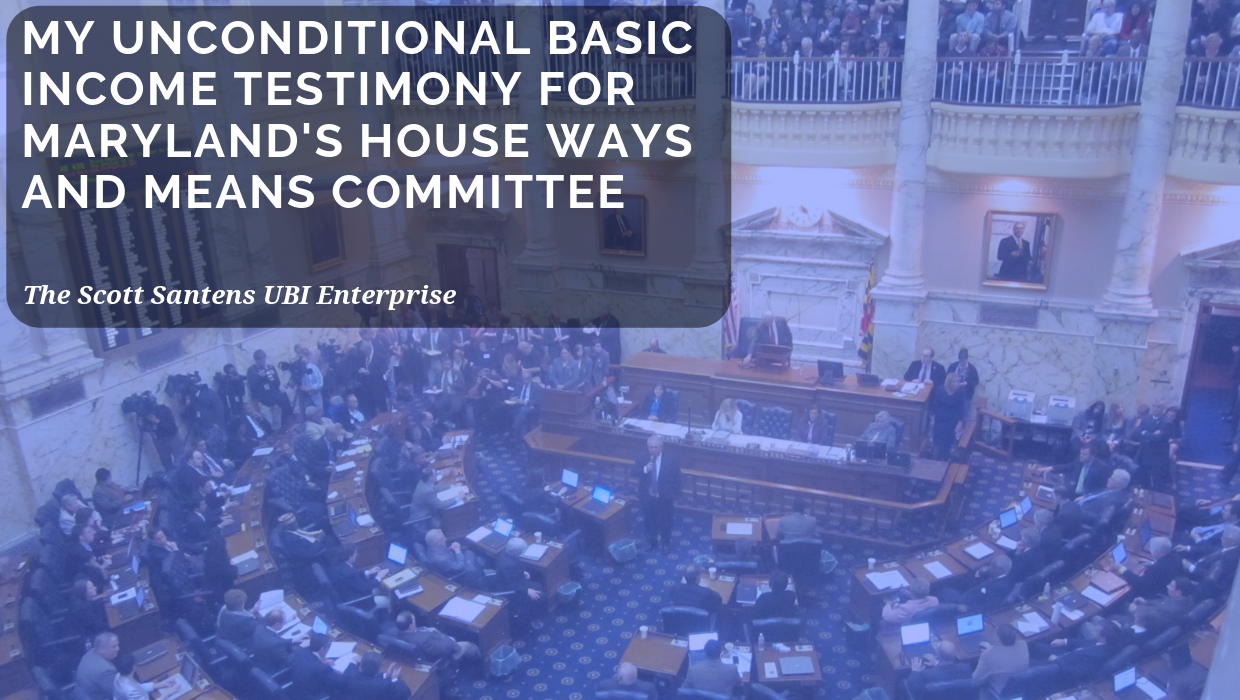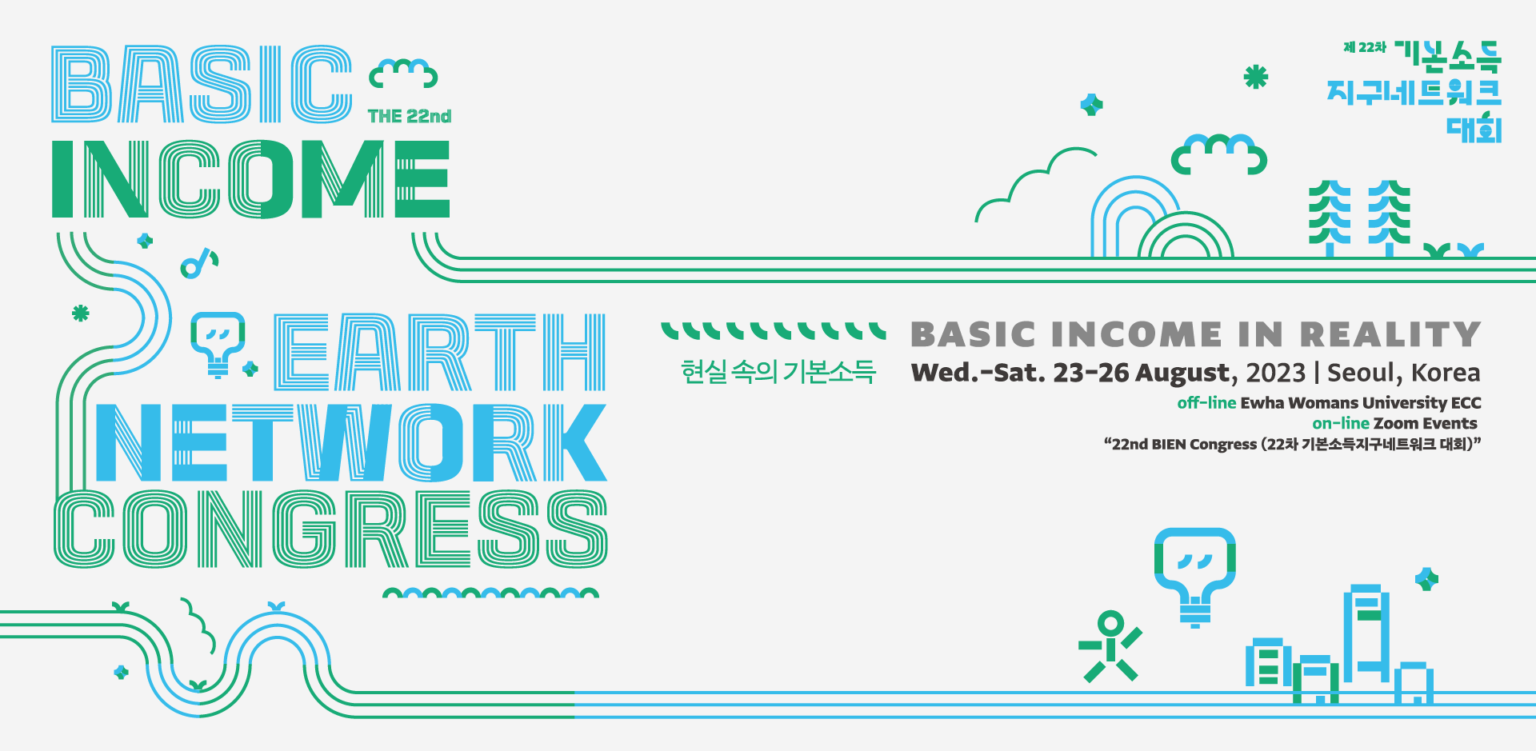My Unconditional Basic Income Testimony for Maryland's House Ways and Means Committee

Click here to optionally listen instead of read this post.
In mid-February I was contacted by the legislative aide for Delegate Gabriel Acevero of Maryland who has introduced a bill to create a social wealth fund intended to eventually pay out a cash dividend to every resident of Maryland. As a prominent advocate for UBI, I was asked to provide a couple pages of written testimony to the House Ways and Means Committee about why such a bill is so important. The following is my prepared testimony as submitted for the hearing that took place on March 1, 2019.
Dear Chair Kaiser, Vice Chair Walker, and all the members of the House Ways and Means Committee:
My name is Scott Santens and as someone who has been self-employed since 1997, I’ve been living the future of work since I was 20 years old. As someone who studied both engineering physics and cognitive psychology in college, I have a mind for what works versus what I might want to work, and how people think versus how I might assume they think. Somewhere along the way, I began to be considered among the world’s leading experts on the idea of an Unconditional Basic Income (UBI) and today I’m writing you in support of HB 1089 2019.
The world is changing. That has always been true, but the world is now changing faster than ever. Technology is a tool we invented long ago to enable us to do more with less, and it’s a tool whose abilities, unlike ours, expand exponentially. At the dawn of the 20th century, everyone wanted a better horse. A decade later, hardly anyone wanted a horse, because the car had arrived. Pretty much all the horse jobs were essentially automated away, and the role of the horse in our lives changed forever.
We as humans are the next to experience this sudden automation of almost everything we do in exchange for money. Automation has always created new and better jobs in the past, but this time it really is different. This time, thanks to the invention of limited forms of artificial intelligence that are able to learn, in combination with increasingly capable machines with decreasing price points, many forms of work will soon no longer make economic sense for a person to perform.
You see, all work can be divided into four types: routine and nonroutine, cognitive and manual. Routine work is the same stuff day in and day out, while nonroutine work varies. Within these two varieties is the work that requires mostly our brains (cognitive) and the work that requires mostly our bodies (manual). Where once all four types saw growth, the stuff that is routine hasn’t grown since 1990. This happened because routine labor is easiest for technology to shoulder.
Distressingly, it’s exactly routine work that once formed the basis of the American middle class. It’s routine manual work that Henry Ford transformed by paying people middle class wages to perform, and it’s routine cognitive work that once filled office spaces. Such jobs are now increasingly unavailable, leaving only two kinds of jobs that have maintained promising outlooks: jobs that require so little knowledge that we pay people little to do them, and jobs that require so much knowledge that we pay people quite well to do them.
We have arrived at a new point in human history however when all four forms of work can now be increasingly performed more capably and more cheaply by servants made of silicon. It’s important to understand both: capability and cost. Over time, capability will do nothing but improve, and over time, cost will go nowhere but down. This is not a matter of a future that may happen, either. It’s already in the process of happening.
Most Americans know that we’ve been eliminating our manufacturing jobs, but only about one in four know that we’re also manufacturing more now than ever. We’re simply able to produce far more with fewer workers. A small percentage of the technologically unemployed are finding new and better jobs, but the overwhelming majority are having to find new ways of working with far less pay and far more financial insecurity.
All of the net employment growth since 2005 has been in alternative work arrangements – defined as temp workers, on-call workers, contract workers, and freelancers. They are jobs our existing safety nets aren’t really designed for. They lack protections and benefits. They lack stability and security. Incomes are insufficient and vary greatly month to month.
This is all a recipe for disaster, and we’re already seeing it happen. Life expectancy is falling and has been since 2014. Deaths of despair are an official category on the rise where people are increasingly taking their own lives, or medicating themselves to death using alcohol, opioids, or other drugs. These have been particularly destroying the lives of rural white men and women without college degrees since 2000, with mortality rates going nowhere but up.
All of this is what got me looking into the idea back in 2013 of just providing everyone a flat monthly stipend without conditions, a source of income that everyone could depend on to always be there, a kind of Social Security for All. What would the effects be? What evidence was out there to apply to this question?
It was then that I discovered the experiments with guaranteeing incomes back under Nixon in the 1970s, and the experiment in Canada in the town of Dauphin that for five years effectively eliminated poverty. I discovered the experiments that were done in Namibia and India this century with fully universal basic income, where everyone in a defined area got the same amount. I dove into the studies of unconditional cash transfer programs all over the world. And I looked right in our own backyard at Cherokee dividends and the annual dividend in Alaska that goes to every resident of Alaska as a right of residency.
Like a puzzle that came together over time, it eventually became clear I was looking at a picture that has so far eluded us. Here’s what I saw: trusting people with money to decide for themselves how to use it is profoundly transformative. Our existing systems built around conditions and non-universality are inefficient and counterproductive. They are a disincentive to work through their removal with work. For those they are intended to reach, they tend to exclude more people than they include. They prevent choices. They are full of stigma. They can be devastating for those with disabilities, especially the ones they don’t consider to be disabled, they ignore unpaid work, and they simply aren’t designed for alternative work arrangements. That is, they are not designed to exist in this century. They are antiquated. They are the past.
If there’s one thing you need to take away from reading this testimony, it’s that the way we currently do things is far too expensive. Poverty is expensive. Extreme inequality is expensive. Financial insecurity is expensive. Chronic stress is expensive. According to a 2018 study from the Brown School at Washington University, childhood poverty alone costs us $1.03 trillion per year. That’s more than the net cost of a national poverty-level basic income guarantee.
What we are doing is wrongheaded. We mean well with our systems designed to target assistance in the forms we think are best to those who we think need it most, but it’s wrong. It’s all wrong. How do I know it’s so wrong? Because that’s what the evidence shows. When people are provided cash without conditions we see all of the following improvements to varying degrees: hospitalization rates go down, crime goes down, stress goes down, birth weights improve, nutrition improves, entrepreneurship increases, educational outcomes improve, social cohesion grows, savings go up, debts go down, home ownership rates increase, behavioral disorders decrease, cognitive functioning improves, and usage of substances like alcohol actually slightly decreases. This is only a partial list.
How can there be so many improvements? It mainly comes down to three things: people need enough money to pay for what they need, people need enough stability in their incomes to plan ahead and worry less, and people need to exist in environments where inequality isn’t so extreme so as to erode social bonds. All of these factors are improved by a flat amount of income, provided universally on a regular basis, that functions as a foundation upon which to build one’s life as an individual and as part of a community of individuals operating on the same equal foundation.
This is why UBI is so important. It improves society across a wide range of factors and it functions as a 21st century safety net built as a floor that’s always there to support everyone instead of a net for people to fall through or get trapped in. If this floor is designed to rise as productivity rises, it functions as a way of making technology work for everyone as an automation dividend where everyone is better off with automation instead of most people being worse off. It is the policy of the future, and it’s a policy that goes back all the way to our country’s own founding, through the writings of Thomas Paine. It is thus also a profoundly American idea beloved by both Milton Friedman and Martin Luther King, Jr. alike. It’s an idea that is not left or right, but forward.
You have the opportunity in Maryland to help lead the way by leapfrogging over Alaska, and showing that it’s possible to create a fund whose stakeholders are all of Maryland, and who could then receive a monthly dividend paid universally as a right. That’s really the key too, that the cash people receive on a monthly basis be seen as rightfully theirs. No one in Alaska argues about how their dividend is provided to the “undeserving.” There is no undeserving in Alaska. The natural resources of Alaska belong to Alaskans. The same is true in Maryland, but can be true to an even greater degree, as there is more natural wealth than just oil, and there is more collective wealth than just natural wealth.
In a study by Gary Flomenhoft titled, “Applying the Alaska model in a Resource-Poor State: The Example of Vermont,” he concluded it was possible to create a universal monthly dividend there at least equivalent to Alaska’s dividend, and possibly even as high as $10,000 per year. The wealth is out there. It’s just a matter of no longer giving it away and seeing it instead as Alaska sees their oil - something partially owned by everyone.
You have the opportunity to be a pioneering state, to show the way forward this century, by doing two things that together are nothing short of evolutionary. The first is to recognize citizens as co-owners of natural and collective wealth, and the second is to trust them enough to treat them as stockholders instead of the inherently lazy in need of poverty to drive them, and bureaucrats to make their decisions for them.
Maryland can be the first state to truly emancipate its citizens with real freedom and economic justice for all. As one future horse to another future horse, I pray you consider these words well.
Regards,
Scott Santens

Did you enjoy reading this? Please click the subscribe button and also consider making a monthly pledge in support of my daily advocacy of basic income for all.
_large.jpg)
UBI Guide Newsletter
Join the newsletter to receive the latest updates in your inbox.



